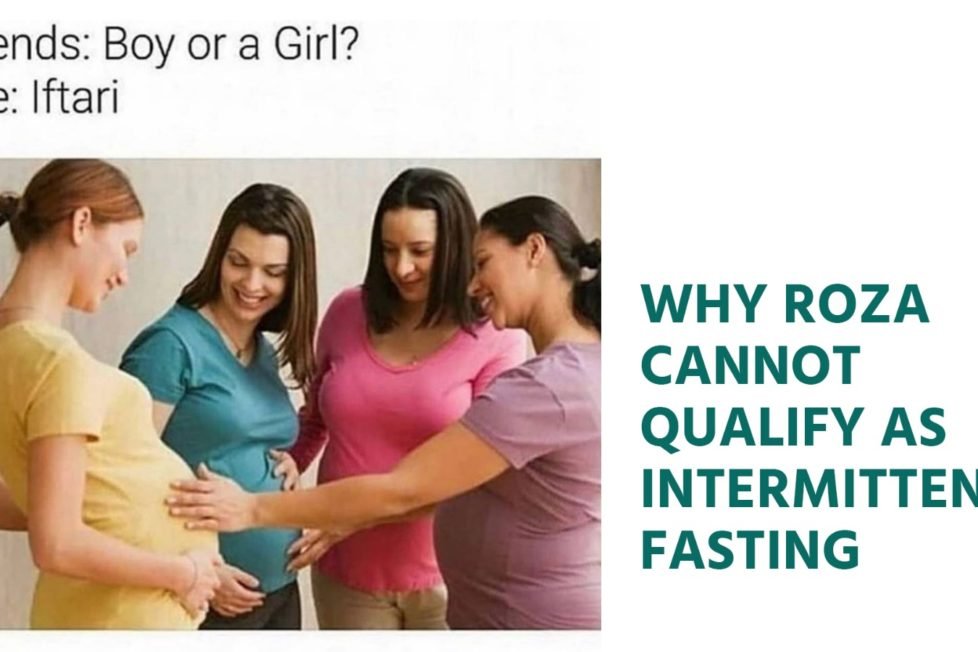Does Ramzan Roza qualify as intermittent fasting?


Discussions are ongoing about the month of Ramzan and its health benefits. Various publications which find multiple faults in Karva Chauth and Navratri Vrat suddenly start waxing lyrical on the health benefits of keeping Roza as soon as the month of Ramzan approaches. The latest fad is labelling Roza as the original intermittent fasting ritual, in turn pushing hapless diabetic patients into a death trap.
While intermittent fasting encourages people to maintain a healthy lifestyle by restricting their eating window, and encouraging a food fast of 12-16 hours post dinner, Rozas have to be kept during day time when the body is deprived of not only all kinds of food but also of water. The sleeping pattern is disturbed because you sleep with a heavy stomach and then wake up for Sehri (pre Roza meal) at 4 am. You eat at abnormal hours and in larger than normal quantities both at Sehri and Iftar. After breaking your fast, you end up eating junk food with some smattering of fruit heavily laden with masala, and spoons upon spoons full of sugar in sherbets and cold drinks.
During intermittent fasting, one is encouraged to take in a lot of water or green tea etc, both before going to bed and after waking up. This is supposed to flush the system of toxins and replenish the water level within the body. All drinks which are zero calorie and have minimal or no chemicals are to be consumed during the fasting period. On the other hand, Roza does not allow any intake of water, even the brushing of teeth is prohibited in many parts of the community during Roza fast, as it may provide a little relief to the rozedaar. Many countries where majority of the population observes Ramzan fasts have hot climates, and depriving the body of all fluids for 14-17 hours (depending on the calendar month) is akin to torturing the body. Further, the bacteria gathered in the mouth due to lack of brushing and no moisture is seriously detrimental to the health, encouraging throat and gum related infections.
Intermittent fasting is aimed at hastening the metabolism, so it is heavily recommended that during the eating window, one should stay away from deep fried food, fast food and sugar concentrated food items, and focus on intake of nutritious food items and beverages. The food intake during Ramzan Roza is based on cravings that one collects during the day as the focus is not on physical health or purification of mind, but on penance for sins and collecting rewards (Sawab). There is no recommendation anywhere in the faithful text about what kind of food should not be consumed during Roza fast, to ensure any kind of spiritual awakening or connection. This is laughable, specially when the month is supposed to be the epitome of spiritual awakening in the faith. In the absence of any such guidelines or recommendations, the faithful take this as a go-ahead for indulgence, and attack any edibles in sight after Iftar time. Mostly, all the items served at Sehri and Iftar are deep fried, high in salt or sugar, and low on nutrition. As a result, this whole experience slows down the metabolism, and is prone to developing health complications over the course of time.
One of the main benefits of intermittent fasting is a spike in energy. People who generally complain of fatigue and listlessness have reported to be rejuvenated after observing intermittent fasting on a regular basis. The best suggested method of IF is having dinner at around 7 pm, skipping breakfast, and then going for an afternoon meal. This way, the fat burning kicks in after the body is rested through the night, 12 hours post last meal. This method doesn’t hinder the normal work day of a person, after the system is used to this schedule.
The Roza fast requires for the eating cycle to fit into a window post sunset until before sunrise, 6-9 hours depending on the time of the year. Because the focus is on reaping imaginary faith based bounties and not physical and emotional well being, this window is crammed with binge eating, which starts from 1-2 hours before sunrise. This results in the stomach becoming a bloated sack of food, and the body has to endure this for 12-14 hours before the mad scavenging of food picks up. The high calories, dehydration, hormonal imbalance, disturbed circadian rhythms, and elevated sugar levels put a person at numerous health risks. The body is unable to function in a normal manner, which results in low productivity work wise too. Taking the example of Pakistan, where work screeches to a halt during the month and Roza takes the blame of general inefficiency. Tempers sore specially pre Iftar time when everyone is in a great hurry to get home in order to binge, and multiple fights break out on roads. Discord and disharmony inside homes also increases, and the whole family suffers in a race to reap faithful bounties.
The biggest risk of Ramzan Roza is diabetes. The variation in blood sugar which results during a typical Roza damages the body in the long run to the extent that it may fall victim to type 2 diabetes. Ironically, intermittent fasting is known to cure early onset of type 2 diabetes in many people. Additionally, Ramzan Roza can be lethal to a person already suffering from diabetes, and many well wishing doctors advise such people strictly not to observe Roza.
Finally, something so beneficial to health would ideally be spread out throughout the year to gain maximum benefits. So if anyone believes that Ramzan Roza is the original intermittent fast, then why is it limited to one month in the year?
DISCLAIMER: The author is solely responsible for the views expressed in this article. The author carries the responsibility for citing and/or licensing of images utilized within the text.
